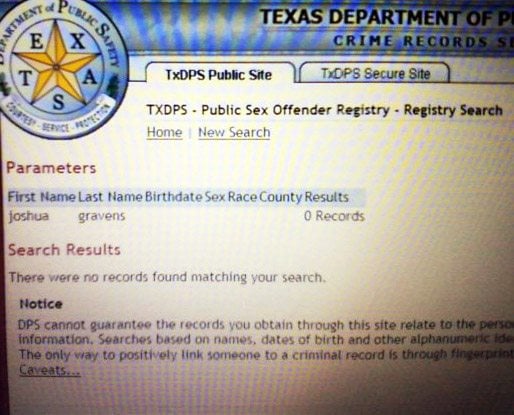
Report: Listing Child Sex Offenders Violates Human Rights
Above: Screen grab of Joshua Gravens' Texas Department of Public Safety record.
Human Rights Watch released an extensive report today called “Raised on the Registry: The Irreparable Harm of Placing Children on Sex Offender Registries in the US.” It makes a case for exempting minors from the requirements that lump juvenile sex offenders in with adults: registration, by which police are kept notified of the offender’s current address, work, and appearance; notification, by which this data is made available to the public, usually via internet; and residency restrictions, by which offenders are barred from living or working near a place where children congregate.
While all the laws specific to sex offenders wreak special havoc on children, perhaps the harshest are residency restrictions. Intended for adults, residency restrictions often bar children from attending school and in many cases can even break up families if the juvenile offender isn’t allowed to live with his or her siblings. One Texas child interviewed for “Raised on the Registry” had to move with his mother two hours away while his father kept his siblings. Another, age 14, couldn’t live with his mother because he had siblings but couldn’t leave the state to live with his father, and so was put in a juvenile home.
Nicole Pittman, a leading national expert on the effects of sex offender registration on children, investigated more than 500 cases in 20 states for “Raised on the Registry,” including in-person interviews with more than 200 youth sex offenders. One of those was Josh Gravens whom I profiled in last June’s Observer cover story, “Life on the List.”
Gravens had non-penetrative sexual contact with his eight-year-old sister when he was 12. He was adjudicated for sexual assault of a child, spent three years in the Texas Youth Commission, and was sentenced to remain on the list until he turned 31.
Another unintended effect of sex offender laws is that they usually reserve the harshest penalties for those who offend against children. This is makes sense when offenders are adults, but since most children offend with other children, experimental play can result in mandatory lifetime sex offender registration. Another unintended component is that while registries list the age of the victim and the current age and photo of the offender, they do not list the age of the offender at the time of offense. Josh’s age difference from his victim grows every year.
Or did, until Josh was removed from the public registry in November after he showed “Life on the List” to the judge who sentenced him. Josh is now a finalist for a George Soros Justice Fellowship. If granted, the fellowship would let him spend two years educating lawmakers about the effects of including children on public sex offender registries. (“Life on the List” also won a Sigma Delta Chi award this year for public service in magazine journalism.)
But few are as lucky as Josh. “Raised on the Registry” makes a strong case for child registration being considered a violation of human rights, and the results are dire. Besides struggling to graduate from school, find and keep a job, and make in a stable home, many experience harassment and violence, many attempt suicide, and some succeed. Though juvenile sex offenders are among the least likely to reoffend and most responsive to treatment, for many, their childhood crimes are life sentences. For others, they’re death sentences


